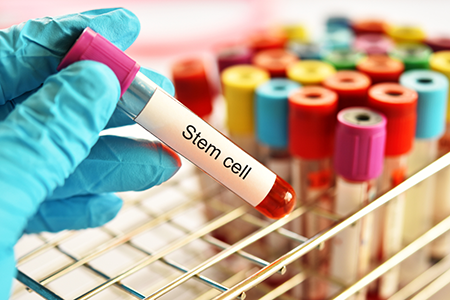
8 questions about cord blood banking for parents-to-be
If you're expecting, you may have heard about cord blood banking. This option allows you to save blood from your baby's umbilical cord after delivery. In some cases, the specific cells found in umbilical cord blood can be used as part of the treatment for medical conditions later on.
However, cord blood banking has both pros and cons. To decide if it is right for your family, talk to your OB GYN about your options. Here are some of the most common questions parents-to-be have asked about cord blood banking.
How can cord blood be used later?
Cord blood is approved by the FDA for procedures known as "hematopoietic stem cell transplantation." A stem cell transplant may be used as a treatment for blood cancers, such as leukemia or lymphoma. It can also be used for many other non-cancerous conditions, like sickle cell disease, immune system conditions, or neurologic conditions.
What are the odds my child will benefit from cord blood banking?
While treatments created using cord blood are beneficial for some, stem cells from cord blood aren't necessarily a guaranteed cure for these conditions. Also, the likelihood of needing a blood stem cell transplant is low. According to the Journal of Transplantation and Cellular Therapy, the lifetime chance of a person in the United States receiving this type of transplant is less than 1%.
How much does private cord blood banking cost?
The Parent's Guide to Cord Blood Foundations says the first-year cost of private cord blood banking is around $1,200 to $2,000. After this initial cost, most private services charge yearly fees for cord blood storage. If you choose to bank your baby's cord blood, make sure you look at different cord blood banks and understand the costs of each one.
Can I donate my cord blood?
In some cases, you can choose to donate your cord blood to a public bank. This option allows the blood to be matched on a registry to those waiting for a transplant. Often, this provides lifesaving treatment to someone in need who is outside of your family. However, not all hospitals collect cord blood for public banks. You can find a participating hospital through the Be The Match website.
Are there any risks to cord blood banking?
The process of collecting cord blood happens after your baby is delivered. Because of this, there aren't risks to you or your baby during the actual collection process. If you have an emergency during delivery, your care and the care of your baby will always be put first - above any plan to collect cord blood.
What happens before delivery if I choose cord blood banking?
Cord blood banking takes some preparation before you deliver. You'll need to choose a cord blood bank, learn about its process, and communicate this with your OB GYN and other healthcare providers. Talk to the hospital where you plan to deliver several weeks before your due date to make sure this is an option.
What happens after delivery if I choose cord blood banking?
After the umbilical cord is cut, your OB GYN or other hospital staff collect blood from the cord. This blood is then frozen and stored by a blood bank. If you choose a private bank, you'll be responsible for yearly storage costs. If you choose a public bank, the blood will be tested and registered with the National Marrow Donor Program for a potential match.
In what cases is cord blood banking recommended?
In general, private cord blood banking for personal use isn't recommended by the American Academy of Pediatrics. The American College of Obstetricians and Gynecologists agrees that storing stem cells as insurance against a future condition isn't typically needed.
However, there are some cases where private cord blood banking may be right for your family. For example, you may consider this option if your baby has a full-blood sibling with a diagnosed medical condition who could benefit from cord blood. In these cases, private cord blood banking could be a lifesaving option for the sibling.
If you're delivering at a hospital that collects cord blood for a public bank, this can be an opportunity to help someone else at no cost to you. But you'll want to make sure you fully understand where and how the cord blood you donate will be used.
If you have more questions about either private cord blood banking or donating cord blood to a public bank, your OB GYN can help. He or she can provide more information about current guidelines as you weigh the benefits and costs of your options.
